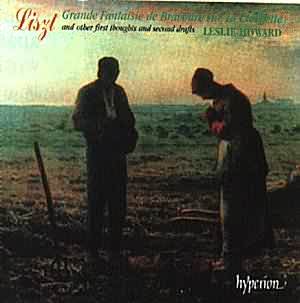
Hyperion's magnificent and truly laudable Lisztcycle approaches the finishing
line with this mammoth treasure trove of hidden delights that will enthuse
all lovers of the piano. Indeed Leslie Howard waxes lyrical about most of
the pieces in his scholarly notes, so if he is eager then why shouldn't we
be so too? The Grande Fantasie that heralds the first disc is truly titanic,
here Lisztmatches Paganini in his wizardry and it would be idiotic not to
say that Howard's performance is masterly in every respect.
The short Waltzes and Polonaise are also brilliantly done although one must
admit that most of these shorter works are rather trivial. However the
2nd Legend entitled, 'St Francis de Paule walks on water' is indeed
pianistic impressionism at it's finest and contains much that is memorable
and hauntingly beautiful. Other works which left a profound impression on
me and that emanated from the first disc where the short but thoroughly charming
'Wallenstein's Lake' and the poetically haunting; 'The Cypresses of the Ville
d'Este', an intoxicating tone poem of miraculous beauty. The short Variations
on Paganini's Carnival in Venice' are also vintage Lisztwith devilish
double-stops and glissandos, more than a match for Howard's scintillating
virtuosity.
The second CD begins with a truly awesome pianistic rendition of the
9th Symphonic Poem, 'Hungaria'. This is one of the most static
symphonic poems, but when heard in a pianistic guise it retains its formal
heroic layout but adds to its virtuoso content. Howard's slow tempo clocks
in at 22'37 but one cannot fail to appreciate what Lisztcould make out of
orchestral pieces with his pianistic mind. The 'Rackockzy March' follows
hot on the heels of that noble salute to Hungary and this piece is full of
those typical rhythms that make Lizst's homeland so mysteriously romantic.
Once again, I was left awe-inspired at the guise the orchestra changes to
when confronted with the keyboard version. Howard is also superb in the two
excerpts from the oratorio, 'The Legend of St Elizabeth' which shows Lisztin
his spiritual guise. The Valse Oubliee' and the Grand galop chromatique are
also summarily dispatched whilst the Huldigungsmarsch concludes this second
installment in true virtuoso fashion.
By the time I popped the third CD into my player, I was feeling slightly
out of depth when confronted by such incredible genius. And if I thought
there was going to be a letoff, I was sorely mistaken as Howard plunges tooth
and nail into another Paganini variation, this time on 'La Clochette et Le
Carnaval de Venice'. The pianist becomes literally possessed by his mentors
devilish demands, at times it really seems that the piano would be about
to disintegrate, such is the force of this music! A short Angelus provides
the ideal interlude before the mammoth 'Historische ungarische Bildnisse',
a veritable tone poem of piano genius.
This half-hour long work contains much that is virtuosic but there are also
moments of deep solitude which are well characterized by Howard. Another
version of the previous Angelus makes a welcome break before the grand finale',
yet another Paganini set of variations. This titanic work makes a fitting
conclusion to this incredible three-disc set of delightful rarities that
takes its place amongst one of the finest issues in the series, primarily
for collectability. Hyperion's recording is the usual model of clarity and
as already mooted, the notes are first-class. As for the playing, well you
can't imagine it if you haven't heard it can you? So just go out and buy
this set!
Reviewer
Gerald Fenech
Performance: 
Sound: 
